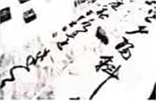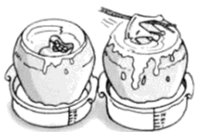What do we do when we go camping? First, we make a plan(计划). We take food, clothing, a knife, and things for cooking and eating. We take things to keep us away from insects(昆虫) and the sun.
Then we put everything into the car and we drive to the woods. We look for a place for campers(露营者) and we look for a good place for our tent(帐篷). The place should have a lot of moving air(流动的空气). This will keep some insects away. High land with water on both sides of it is good. Then we put up our tent. We put everything into the tent, and we are ready for fun. We can swim in the lake, walk in the woods, climb a mountain, row a boat, or go fishing.
In the evening we come back to the tent, and we make a big fire because it can keep the insects away. We sit around the fire and talk. We may tell interesting stories or we may sing songs.
At night we lie down on the grass. We can look up at the stars. It is a busy day, so we try to go to sleep early.
Everything is dark. Everything is quiet. We hope we won’t hear music from the radio in the next tent. We hope it won’t rain.
| A.make a plan |
| B.take some food |
| C.take things to keep us warm |
| D.take something for cooking and eating |
| A.by bus | B.by car |
| C.by bike | D.on foot |
| A.one or two | B.only a few |
| C.many | D.two or three |
| A.it is cold at night |
| B.it can keep us warm |
| C.it can keep the insects away |
| D.it is dark and quiet |
| A.hear music from the radio | B.go to sleep early |
| C.have rain | D.be busy |
Zheng Xin is a firefighter.One day he was trying his best to control the fire of a burning house.Outside,he heard the cats crying.He couldn't stop his work at the moment,but he decided to look for the cats after the fire was put (A) ______.
(B) took , a , control , long.it , time , to , the , fire.Luckily,no one inside was hurt Then he began to find out where the cat noises were from.There was still a lot of smoke and heat coming from the building.He followed the cat noises to the sidewalk in front of the house.There were five scared baby cats crying together.They must have been inside the building,as their fur was badly hurt.Zheng Xin wanted to find the mother cat.Clearly,she had gone into the burning house and carried out all her babies,one by one - unbelievable.
He finally found her.Her paws and face were blackened,and her fur was burned all over.He could even see her reddened skin (皮肤) under the burned fur.She could hardly move.Zheng Xin picked her up and let her relax in his arms.He decided to save this brave mother cat and her (C) family.
The animal doctors told him they would watch the baby cats and their mother carefully,but they weren't confident about the mother's chances.They provided her with the best medical care.About a week later,Zheng Xin was excited that the mother cat would be alive.They named her Scarlet because of the color of her skin.
Zheng Xin was happy that Scarlet got together with the baby cats again.She touched each (D) ______ them,nose to nose.She risked her life and all of her babies were saved.As a firefighter,Zheng Xin sees heroic acts every day.But that day,what Scarlet showed him was (E) ______.
阅读短文,根据题目要求完成下列任务。
(1)在文中(A)处和(D)处各填上一个恰当的词:
(2)将文中(B)处单词连词成句。
(3)用英文写出文中(C)处 family所指的内容:
(4)在文中找出一个与所给英语释义相匹配的单词 :very difficult to believe
(5)为(E)处选择一个适合的选项:
A.a firefighter's Move
B.doctors' love
C.a mother's love
A Frenchman Niepce,needed pictures for his business.But he was not a good artist.So he invented a very simple camera in 1826.He put it in a window of his house and took a picture of his garden.That was the first photo.
The next important date in the history of photography (摄影术) was in 1837.That year,Dagueme,another Frenchman,took a picture of his reading room.He used a new kind of camera in a different way.In his picture you could see everything very clearly,even the smallest thing.
In 1840,photography was developed once more.Then photographers could take pictures of people and moving things.But the photographers had to carry many machines.
With the development of science and technology,a Chinese young man Wang Mengqiu,invented Hover Camera (无人相机).It can record people and things more wonderfully.He once studied at Stanford University in the United States.He became famous overnight because of the invention.
Hover Camera records movements with a 13 MP camera and takes 4 K videos.You can use a smartphone to control it.It can follow you,flying or staying in mid﹣air.In this way,it can get the perfect pictures.It is the best choice for weddings,sports games and holidays because Hover Camera is convenient for the users to carry.It can be folded,so it can be put into a small bag.When the power is low,it can land safely.
In the future,cameras will be designed better and better.People can take more lively photos and videos.
阅读短文,回答下列问题。
(1)What was in Niepce's first picture?
(2)How was Daguerre's picture when he used a new kind of camera in a different way?
(3)When could the pictures of people and moving things be taken for the first time?
(4)Who invented Hover Camera?
(5)Hover Camera isn't convenient for the users to carry,is it?
Your summer vacation is coming.The following activities in your city can help you to have a colorful vacation.
|
Paintings & Calligraphy (书法) Great changes have taken place in China in the past 100 years.To show love for the Communist Party of China,100 students from different schools will use their pens and brushes to show you the great changes. Time 10:00﹣15:00 July 1 st﹣﹣July 15 th,2021 Closed on Mondays Place Achievement Hall |
Inventions To memorize Yuan Longping,Father of Hybrid Rice,people in our city will show you their greatest inventions on saving food.In the show,you can see a lot of new inventions from people at different ages.Guides will stay with you from the beginning to the end. Time 13:30﹣16:00 August 10 th﹣﹣ August 11 th,2021 Place Sunshine Hall |
|
A book on embroidery (刺绣) The book Xun Xiu Ji has been named China's most beautiful book.Zhang Shulin is the writer of it.We have invited Fan Deng to introduce it to us.For more information,call Linda at 679﹣8871,please. Time 14:00﹣15:30 June 30 th,2021 Place school hall |
Volunteers To keep away from COVID﹣19,we'd better get vaccinated (接种疫苗).But many people in our community are afraid of it.Please work for our community to tell them the importance of getting vaccinated and help to reduce (减少) the worries. Time 13:30﹣15:00 July 15 th﹣July 24 th,2021 Place community office |
阅读以上信息,从每小题所给的A、B、C三个选项中选出一个最佳选项。
(1)In Achievement Hall,you will see .
| A. |
a book |
| B. |
a painting and calligraphy show |
| C. |
many inventions |
(2)Who will introduce the book Xun Xiu Ji to you on June 30 th,2021?
| A. |
Zhang Shulin. |
| B. |
Linda. |
| C. |
Fan Deng. |
(3)How long will the invention show last (持续) during the two days?
| A. |
2.5 hours. |
| B. |
5 hours. |
| C. |
7 hours. |
(4)If Zhang Wei is a volunteer in the community,what should he do?
| A. |
He should help people to reduce the worries. |
| B. |
He should lay out the paintings from 10 students. |
| C. |
He should invent something new to save food. |
(5)The Greens will come to your city on August 10 th,2021.What can they see?
| A. |
Embroidery works. |
| B. |
Painting and calligraphy works. |
| C. |
New inventions on saving food. |




阅读下面文字。从A到F选项中为每个段落选出一个最适合的标题。
Hello!I'm your AI robot Andy.Now let's play a game.I'll describe some kinds of activities.Please match the topic with the description.Are you ready?Go!
(1) It is a great way to teach you the importance of using your own hands to create something from nothing.
(2) If you lose yourself in it,you can find a whole new world without leaving your house.And you can do better than non﹣readers in schoolwork and exams.
(3) They are physical activities.People compete against each other.Sometimes speed,skills and teamwork are needed.
(4) Maybe you are not naturally more musical than others.If you enjoy singing,dancing or playing an instrument,they can become great hobbies.
(5) Whether they are stamps,coins,cards,model cars,or whatever else interests yon,it's a great way to learn about people and places.
|
A.Collections B.Speaking C.Music D.Art.E.Reading F.Sports |


One day in ancient Greece, King Hiero asked a crown(皇冠)maker to make him a golden crown. When he first saw the crown, he was happy with it. "It's a nice crown, isn't it?" he asked his men. But later, he began to doubt whether it was a real golden crown. The king sent the crown to Archimedes, a great scientist, because he wanted Archimedes to discover the truth.
"This problem seems difficult to solve. What should I do?" thought Archimedes. He was still thinking about it as he filled his bath(浴缸)with water. When he got into the bath, some water spilt(溢出). "That's it!" shouted Archimedes. "I know how to solve the king's problem!"
Archimedes went straight to the palace to see the king. In the palace, he told the king he had an idea. First, he weighed the crown and asked the king for some gold of the same weight as the crown. Next, he put two pots into two big bowls and filled both pots with water. Then, he put the gold into one pot, and some water ran into the bowl. Finally, he put the crown into the other pot. This time, even more water ran into the bowl.
"Look at this," Archimedes said to the king. "The gold of the same weight as the crown made less water run into the bowl, but this crown made more water run into the bowl. So I'm sure that it's not made completely of gold."
"The crown maker fooled me, didn't he?" shouted the king. He then punished the crown maker. At the same time the king praised Archimedes.
根据短文内容,回答下列问题。
66.Why did the king send the crown to Archimedes?
67.What happened when Archimedes got into the bath?
68.Where did Archimedes go to see the king?
69.Which made less water run into the bowl,the gold or the crown?
70.Who did the king punish at last?